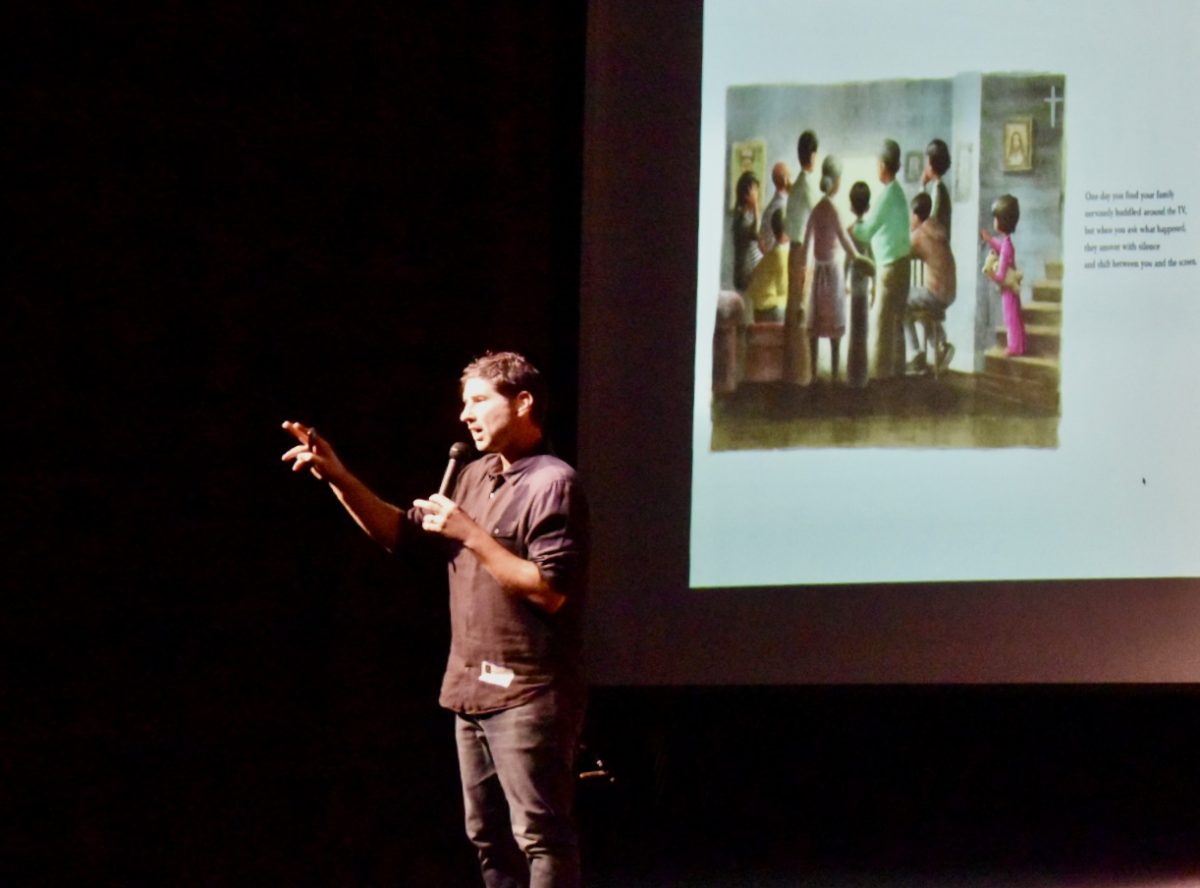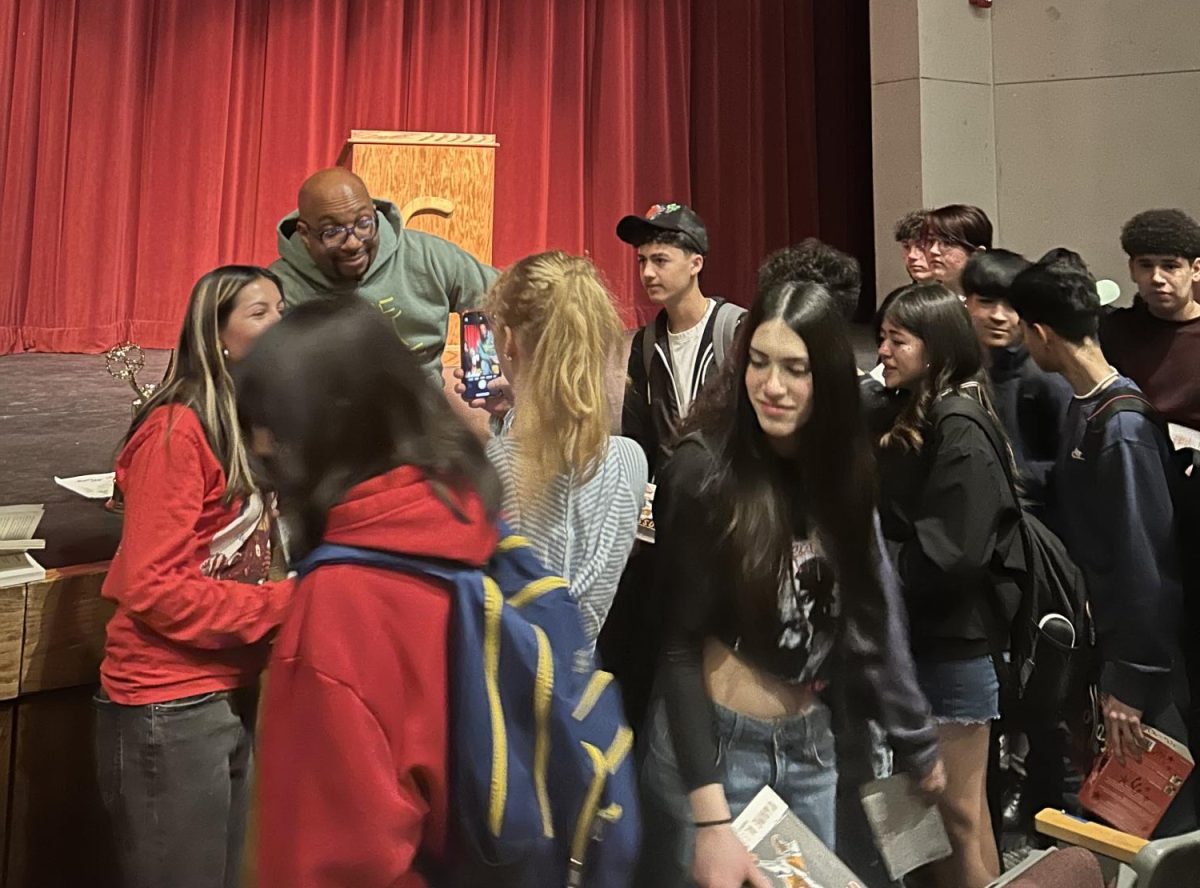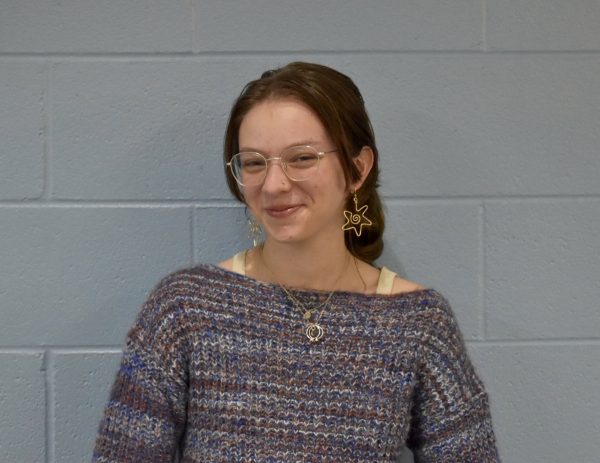Last week, Matt de la Peña, an acclaimed author, visited Centaurus and several other BVSD schools in the area, to give a talk about his experience as a writer, and how he came to be one. He has written many books, including his novel Mexican Whiteboy, Centaurus’ current school-wide read.
De la Peña especially emphasized the importance of perspective in his writing. The personal experience of every person shapes the way they view the world, and de la Peña builds his stories off of this very thing. His own experiences are reflected in the stories he tells.
De la Peña’s perspective was shaped by the people in his life. It began with his grandparents, who had an idea. De la Peña’s grandparents had lived in Tijuana, Mexico all of their lives. But just before his grandmother had his dad, they decided to try and get to America, in search of better education opportunities for their son.
They only traveled about ten miles, to National City in San Diego County, but this action drastically changed their lives.
This was an incredibly difficult journey, even though the distance wasn’t far.. De la Peña’s grandparents were undocumented, and there was so much to consider; where would they live, what jobs would they have, who would be their community?
“If my grandparents didn’t make that journey, I wouldn’t get to stand here in front of you and call myself an American author,” He explained.
De la Peña’s perspective is also shaped by his parents. His dad had to drop out of high school because he had kids when he was very young. But, even though he never finished school, Mr. de la Peña always worked hard to support his kids. He would get up incredibly early in the morning to go to work, de la Peña said. Then he would come home, rest a bit, and get to his next job. De la Peña remarked, “Even though he worked with cement and his hands, and I work with words, I still try to live up to his work ethic.”
His mom was also an especially influential person in de la Peña’s life. She had not been raised by her biological parents, and had been in foster care and never experienced stability in her homelife, but she cared for her kids very much. Even though they weren’t rich, and he didn’t grow up in the nicest neighborhood, de la Peña believes was lucky because he had a person in his life that looked at him like he was very, very special.
Another important part of de la Peña’s point of view is his own experience of living in between different identities. He is mixed race, both Mexican and white. He loves literature and basketball, two things that did not mix when he was in high school. De la Peña’s experiences of lacking a sense of belonging have influenced how he sees the world.
De la Peña grew up in his grandparents’ house. Because his parents started their family so young, they didn’t have much money. “I used to think I was totally disadvantaged because we didn’t have our own place, but looking back I feel lucky, because even though there were a lot of us in a small space, there were always people looking out for us,” he explained. His world was his grandparents’ neighborhood in National City.
When he went to high school, though, this changed.
De la Peña attended a high school in a different neighborhood, one where about half of the students had parents that went to college.
Before this moment, de la Peña knew next to nothing about higher education: “I had never met anyone who had been to college when I was in middle school–never.” His parents hadn’t gone to college, and neither had any of his friends’ parents.
But he remembers one day asking one of his new friends’ mom’s about it. She had gone to Utah State, and excitedly told him, “Now listen, college is this incredible opportunity. If you get to go to college, you can study anything you want.” This excited de la Peña. He remembers thinking as a kid that he would study psychology, because he thought it was interesting, how people think.
“You can meet people from all over the country, even all over the world,” his friend’s mom continued. De la Peña had never been anywhere beyond a ten-mile radius of his home, and the idea of meeting people from all over was very intriguing .
“And Matt, if you go to college you could meet all these new girls,” His friend’s mom added. This sealed the deal for de la Peña. It became his goal to get to college.
“Let me tell you, having a goal, I believe, can change your life–even if you never achieve the goal.” De la Peña said.
He had never been a top student. He survived school, but his real passion was basketball. Now, a basketball scholarship was his key to college. De la Peña’s mom told him the only way he would be allowed to play, though, was if he maintained his grades and never missed a day of school.
With his new goal in mind, his grades got better. He never got in trouble anymore. He was going to go to college.
But around that same time, de la Peña began to discover his love for literature. The first book he remembers reading that truly blew him away was The House on Mango Street by Sandra Ciceneros. It felt like a book written for him. It was a book that would stay with de la Peña throughout his coming years: “When I was a young kid, I thought, ‘This is what I want to read.’ And then when I got older, I thought, ‘This is what I want to write.’”
De la Peña did make it to college, on a basketball scholarship. He soon realized that he was not good enough to go on and play professionally. So, he began to wonder what he would be, and he started exploring all new possibilities. Eventually, he would choose to become an author, inspired by all of the stories that had had such a profound impact on him.
These stories would also impact de la Peña’s point of view. The House on Mango Street and The Color Purple focused on the importance of characters, which he carries with him into all of his books. He doesn’t believe that writers should go into a project with a message. For him, it is instead the characters that are necessary to a good story. He also fell in love with Inside Out and Back Again, Bud, Not Buddy, and Suttree. De la Peña emphasized the idea that, “Some of the best books you’ll ever read will feel uncomfortable for the first 20 pages.” He stated that you should always give a book a chance- it may just change your life.
And it was then that de la Peña began his new goal: to write his own story, a goal that would carry him to where he is today.
So, as you begin to face the next chapter of your life, de la Peña calls on us to think of the stories that define us, that are our foundation. “Embrace that it’s coming through your point of view,” he said. “That’s what makes art interesting.”
Ultimately, he wanted students to know that It doesn’t take someone exceptional to do amazing things, all it takes is someone willing to take chances, and embrace who they are.
You can check out Matt de la Pena’s book, Mexican White Boy, in the library!













erica chapman • Mar 2, 2024 at 3:33 pm
Thanks for sharing this. I didn’t know this author.